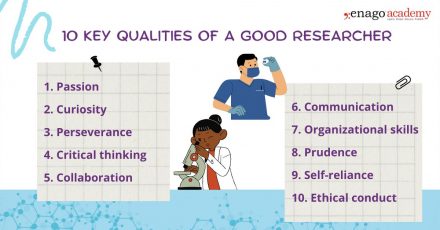Becoming a High-achieving Researcher: 10 key qualities you need to succeed

Are you someone who is passionate about scientific research? To boldly go where no one has gone before, uncovering new knowledge and making groundbreaking discoveries? For centuries, the field of scientific research has been at the forefront of innovation, driving forward our understanding of the world around us and paving the way for many pioneering discoveries that have transformed our lives. But what does it take to become a successful researcher, is it just intelligence and technical skills, or is there something more?
When you think of high-achieving researchers, you might picture a genius locked away in a lab, hunched over a microscope, or pouring over data. But the truth is, being an excellent researcher takes more than just intelligence and technical skills. While technical expertise and academic credentials are certainly important, there are also a number of key qualities that are essential for success in this field. Cultivating these traits is a lifelong process that requires intentional effort and dedication. In this article, we’ll delve into the top 10 essential qualities that set high-achieving researchers apart from their peers.
From critical thinking to creativity, perseverance to passion, these qualities are what allow researchers to excel in their field and make a lasting impact on the world. So if you’re curious about what it takes to succeed as a researcher, read on and discover the secrets to unlocking your full potential in the world of scientific discovery.
What Are the Qualities of a Good Researcher?
So, if you’re ready to rise to the top of your field in research, it’s time to unleash your inner genius and unlock these top 10 essential qualities that can make all the difference. Join us on this journey to discover what it takes to become a high-achieving researcher.

1. Passion:
“Science is not only a discipline of reason, but also of romance and passion.” – Stephen Hawking
Researchers ought to be passionate about their work. They are driven by a desire to make a difference in their field and to contribute to the greater good. When they are genuinely interested in the subject matter, they are more likely to put in the time and effort needed to make significant progress.
2. Curiosity:
“Millions saw the apple fall, but Newton was the one who asked why.”
– Bernard Baruch
High-achieving researchers have an insatiable curiosity that drives them to ask questions, seek answers, explore new ideas, and push the boundaries of what is known. It’s what inspires them to dive deeper into a topic, and to keep digging until they uncover something truly groundbreaking. It allows them to consider multiple possibilities and to think creatively about potential solutions. This can be particularly important in fields where there is a need for innovation or where there are complex problems that require novel approaches. Curiosity can fuel a researcher’s passion for their work.
3. Perseverance:
“Talent is quite common; it is not intelligence that is scarce, but perseverance.” – Doris Lessing
Researchers should also possess perseverance — the grit and determination to keep going, even in the face of setbacks and obstacles. The results of an experiment may not be what was expected, or even worse, the experiment may run smoothly until it is 95% complete before failing. Research can be a long and challenging process, but high achievers don’t give up. Whether it be a manuscript rejection or a stressful PhD workload, they keep pushing forward, driven by their passion and their desire to make a difference.
4. Critical thinking:
“Nothing in life is to be feared. It is only to be understood.”
– Marie Curie
Another key quality of a good researcher is critical thinking. Researchers need to be skilled at analyzing data, identifying patterns, and drawing conclusions based on evidence. They should have a sharp eye for detail and be able to spot inconsistencies and errors in their work. A successful researcher must have the ability to approach problems from a variety of angles. They must be able to analyze complex data and draw meaningful conclusions from their findings.
5. Collaboration:
“The hardest problems of pure and applied science can only be solved by the open collaboration of the worldwide scientific community.”
– Kenneth G Wilson
Research isn’t a solitary pursuit. It is often a team effort, and researchers must know how to work effectively with others. They must be able to communicate their ideas clearly and shouldn’t be afraid to seek out input and feedback from their colleagues. It enables the pooling of diverse perspectives, skills, and resources to tackle research questions, fosters professional networks, helps overcome challenges, and promotes the sharing of knowledge and ideas. As research is becoming increasingly interdisciplinary, having efficient collaborative skills is a significant aspect that can aid in achieving success in research.
6. Effective communication:
“You don’t really understand something unless you can explain it to your grandmother.” – Albert Einstein
A successful researcher must be able to communicate their findings effectively to a wide range of audiences. Whether they are presenting to fellow scientists or the general public, they must be able to explain complex concepts in a clear and concise manner. Whether it is writing an effective lay summary, presenting at a conference, or writing a persuasive grant proposal to obtain research funding, communication skills are an essential asset for every researcher. Researchers who are able to effectively communicate their findings are better equipped to disseminate their research and have a greater impact on their field.
7. Organizational skills:
“A goal properly set is halfway reached.” – Zig Ziglar
Having a strategy for organizing research notes, data, and literature reviews makes it easier to analyze and synthesize the data later on. Of course, being a high-achieving researcher also requires strong time management skills. Additionally, when working as a team, it is important to keep track of who is responsible for which tasks, what the deadlines are, and what the progress is on each task. It is also important to set aside time for family and friends as well as for oneself. Maintaining a work-life balance is crucial for researchers because it affects their mental and physical health, reducing their productivity. Good organizational skills help a researcher stay on top of their work, manage their time effectively, and collaborate successfully with others.
8. Prudence:
“Prudence is a presumption of the future, contracted from the experience of time past.” – Thomas Hobbes
Prudence is an important characteristic in a good researcher because it involves exercising good judgment and caution in effectively managing resources whether it be time, funding, or materials. It is necessary to strike the right balance between ambition and prudence, and it usually takes time and experience. Researchers often have limited resources and must make strategic decisions on how to allocate them in order to achieve their research goals. Practicing prudence also means taking deliberate steps to plan and evaluate risks, so that research can be carried out with maximum efficiency and effectiveness.
9. Self-reliance:
“Without your involvement you can’t succeed. With your involvement you can’t fail.” – A.P.J. Abdul Kalam
Self-reliance enables researchers to be independent and self-sufficient in their work. It allows them to take ownership of their research and not rely on others for their success. Self-reliance helps researchers be more efficient and effective in their work, as they are able to make their own decisions and solve problems on their own. However, it does not mean that researchers should work in isolation. Collaboration and communication with peers and colleagues are still important aspects of research. Self-reliance simply means that researchers are able and willing to work independently when necessary and have the confidence and ability to make important decisions on their own.
10. Ethical conduct:
“Ethics and Science need to shake hands.” – Richard Cabot
Finally, research requires the highest standards of ethics and integrity. Ethical conduct is an important quality in a good researcher because it ensures that research is conducted with integrity, honesty, and respect for the subjects and participants involved. They must adhere to strict ethical guidelines and ensure that their work is conducted with integrity and transparency. In addition, ethical conduct also involves being honest about the limitations of the research and acknowledging any potential conflicts of interest or biases that may impact the results.
There you go! Are you ready to take your skills to the next level and become a high-achieving researcher? In conclusion, being a great researcher requires a unique blend of skills, qualities, and experiences. While some of these traits may come naturally to some individuals, others can be developed through practice, training, and experience. By cultivating these traits and continually striving to improve, you can become a top-notch researcher and improve your effectiveness, productivity, and impact in your field of study. So get out there, ask questions, challenge assumptions, and make your mark on the world of research! Share your insights with the scholarly community using #AskEnago on Twitter.
Reference:
- Gisbert JP, Chaparro M. Tips and guidelines for being a successful researcher. Gastroenterol Hepatol. 2020;43:540–550. doi: 1016/j.gastre.2020.03.007









![What is Academic Integrity and How to Uphold it [FREE CHECKLIST]](https://www.enago.com/academy/wp-content/uploads/2024/05/FeatureImages-73.png)
Very informative and helpful, thanks.
Explanation provided for each of the skills is top notch.
👍 . I agree . Useful .
I really find this article very helpful. Striving to have those mentioned qualities and become a good researcher soon.